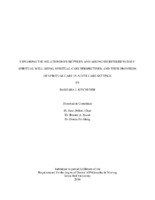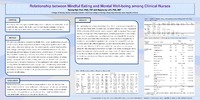Exploring the relationships between and among registered nurses' spiritual well-being, spiritual care perspectives, and their provision of spiritual care in acute care settings
View File(s)
- Author(s)
- Details
-
Dr. Barbara Jennifer Kitchener, PhD, RN
Visitor Statistics
Visits vs Downloads
Visitors - World Map
Top Visiting Countries
| Country | Visits |
|---|
Top Visiting Cities
| City | Visits |
|---|
Visits (last 6 months)
Downloads (last 6 months)
Popular Works for Kitchener, Barbara J. by View
| Title | Page Views |
|---|
Popular Works for Kitchener, Barbara J. by Download
| Title | Downloads |
|---|
View Citations
Citations
Despite acknowledgment that spiritual care is an essential aspect of holistic nursing care, nurses often feel ill-prepared for, uncomfortable with, and uncertain about providing spiritual care. Studies have indicated that nurses who have a strong sense of their own spiritual well-being and/or a positive perspective [attitude, value, belief] about spiritual care are more inclined to provide spiritual care to their patients. However there is a scarcity of such studies among acute care nurses. This descriptive correlational study aimed to explore relationships between and among acute care nurses’ spiritual well-being (SWB), spiritual care perspectives (SCP), and their provision of spiritual care (SC) to hospitalized patients. The Spiritual Variable of the Neuman System Model provided a suitable framework for this study. Data were collected electronically via Survey Monkey® over a six week period from a convenience sample of acute care nurses (n = 130) through the Academy of Medical-Surgical Nurses. The Spiritual Well-being Scale by Paloutizan and Ellison (1982), the Revised Spiritual Care Perspective Scale by Taylor (2004), the Spiritual Care in Practice Questionnaire by Vance (2001), and a demographic/work-related survey were utilized for data collection. Participants in this study were primarily Christian (33.8%), or Catholic (31.5%), female, (90.8%), Caucasian (73.1%), average age 46.05 years, with a Bachelor’s degree in Nursing as their highest educational qualification (61.5%). Most were employed in general medical-surgical units (63%) for an average of 14 years. Pearson’s r analyses revealed significant positive relationships between the dependent variable (provision of SC), and the two independent variables—nurses’ SWB ( r = .27, p = .002), and SCP (r =.63, p = .0001). These findings indicate that nurses who possess a sense of high SWB, and a positive SCP (attitude) are more likely to provide SC to patients in acute care settings. Spearman Rho tests showed moderate to strong positive correlations between and among the dependent variable and three demographic/work related variables, namely —commitment to personal spiritual practices (rs = .31, p = .0001), confidence in providing SC (rs = .45, p = .0001), and comfort in providing SC ( rs = .40, p = .0001) —signifying that nurses who were strongly committed to their spiritual care practices were also confident and comfortable in providing spiritual care and provided such care frequently to their patients in the acute care setting. Multiple regression analyses demonstrated that SCP was the best predictor of SC practices. The nurses’ SCP (attitude) was also shown to have a significant mediating effect between the other predictors and provision of SC. Participants in this study understood that SC may involve non-traditional activities such as active listening and quiet presence. Findings from this study provide evidence that the nurse’s SCP is a significant contributing factor to provision of SC among acute care nurses. There are implications and recommendations for further research studies, nursing education, clinical practice, and policy making.
This dissertation has also been disseminated through the ProQuest Dissertations and Theses database. Dissertation/thesis number: 10126310; ProQuest document ID: 1808831180. The author still retains copyright.
This item has not gone through this repository's peer-review process, but has been accepted by the indicated university or college in partial fulfillment of the requirements for the specified degree.
| Type | Dissertation |
| Acquisition | Proxy-submission |
| Review Type | None: Degree-based Submission |
| Format | Text-based Document |
| Evidence Level | Descriptive/Correlational |
| Research Approach | Quantitative Research |
| Keywords | Acute Care Nurses; Spiritual Care; Nurse Characteristics |
| Grantor | Seton Hall University |
| Advisor | Dellert, Jane C. |
| Level | PhD |
| Year | 2016 |
All rights reserved by the author(s) and/or publisher(s) listed in this item record unless relinquished in whole or part by a rights notation or a Creative Commons License present in this item record.
All permission requests should be directed accordingly and not to the Sigma Repository.
All submitting authors or publishers have affirmed that when using material in their work where they do not own copyright, they have obtained permission of the copyright holder prior to submission and the rights holder has been acknowledged as necessary.
Related items
Showing items related by title, author, creator and subjects.
-
Acute care nurses' spiritual well-being and spiritual care perspectives: Predictors for provision of spiritual care
Kitchener, Barbara J.This study investigated how acute-care Registered Nurses' spiritual well-being (SWB), and spiritual care perspectives (SCP) relate to their provision of spiritual care (SC). Findings revealed nurses with high SWB and ... -
The relationships between spiritual well-being, quality of life and depression among Taiwanese elderly
Cooksey-James, Tawna; Lee, Yi-Hui; Salman, Ali (2016-03-17)Session presented on Sunday, July 26, 2015: Purpose: Depression is a mental health problem commonly impacting elderly people. Elders with Chinese cultural background have a high prevalence of depression. While spirituality ... -
Relationship between mindful eating and mental well-being among clinical nurses
Lee, Haeyoung; Choi, Seung-hyeThe results of this study will provide clinical managers and nursing researchers with an inspiration to develop intervention programs to help nurses have healthy dietary habits and maintain mental well-being. -
The relationships between work-family conflict, job satisfaction and psychological well-being among African American nurses
Gipson-Jones, Trina L.The specific aims of the proposed study, which were derived from Roy's Adaptation model (Roy & Andrews, 1999) are to (1) determine the levels of the dimensions of work-family conflict, job satisfaction and psychological ... -
The relationships among social support, spiritual well-being, commitment and health-promoting behaviors in older adults
Boland, Clara S.Study purpose was to examine relationships among personal factors, social support, spiritual well-being, commitment and health-promoting behaviors in three elderly age groups. Pender's revised Health Promotion Model (HPM) ...





